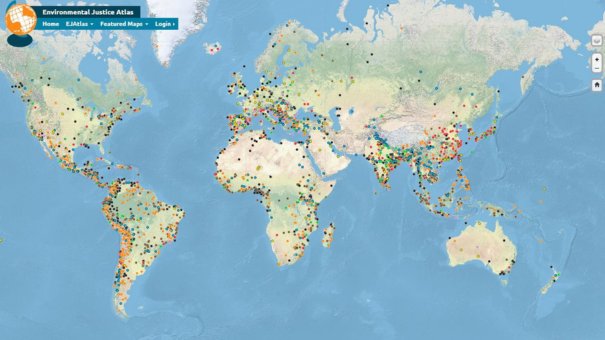The Environmental Justice Atlas (EJAtlas), created by researchers at the Institute of Environmental Science and Technology of the Universitat Autònoma de Barcelona (ICTA-UAB), has documented 4,100 socio-environmental conflicts worldwide, 75% of which occur in low-income countries.

The Environmental Justice Atlas (EJAtlas) detects an increase in disputes over issues related to renewable energy and energy transition.
EJAtlas is an interactive map that identifies and locates ecological-distributive conflicts around the world. Since its launch 12 years ago, this open-access web platform has documented 4,100 cases, 19% of which are caused by fossil fuels and energy generation, another 19% by mining, and 13% by agribusiness, fisheries and forest exploitation.
Through individual records, EJAtlas classifies conflicts according to the type of commodity or natural resource causing them (e.g. land 38%, water 27%, electricity 20%, crude oil 11%, or coal 10%), the country where they occur, the company responsible and the type of exploitation causing them (e.g. access to water and dams 29%, land acquisition 26%, mineral ore exploitation and extraction 16%, deforestation 14%, or toxic waste 12%). Each record provides comprehensive data on the project, the confrontation, dates, impacts, local resistance generated and how the conflict was managed.
The country with the highest number of conflicts recorded in EJAtlas is the United States, with 10% of cases, followed by India (9.6%), Mexico (7.1%), China (6.2%) and Brazil (5.2%). However, researchers warn that these figures do not represent the full extent of the problem, as many disputes in certain countries are not documented or accessible.
ICTA-UAB researchers explain that these conflicts arise from consumption patterns of our current economic model, which is based on the continued extraction of the planet's limited resources. They have identified an increase in disputes related to renewable energy projects, carbon offsetting, protected areas and mining for energy transition, as well as oil, mining and agribusiness activities.
The EJAtlas data highlight a significant movement of activists and local defenders fighting these environmental injustices. These resistance movements succeed in stopping, suspending or delaying about 25% of the documented conflicts, and combine citizen resistance with legal actions in half of the cases.
"The global environmental justice movement plays a crucial role in mitigating the climate crisis and environmental degradation around the world," says Joan Martínez Alier, environmental economist at ICTA-UAB and co-founder of EJAtlas. Despite this, "31% of the conflicts recorded in EJAtlas involve repression and criminalisation of environmental defenders by the authorities. In 18% of documented cases, these activists are victims of physical violence, and in 13% they are victims of murder", says researcher Mariana Walter.
The situation is even worse when the defenders are indigenous peoples fighting against the impact of extractive activities on their traditional lifestyle and culture. Indigenous peoples are mobilised in 34% of the cases recorded in EJAtlas and suffer 27% of criminalisation, 25% of violence and 19% of murders. "This is the environmentalism of the poor and indigenous people, who fight against the extraction of fossil fuels, open pit mines, tree plantations and hydroelectric dams," emphasises Martínez-Alier.
Environmental defenders also suffer more gender-based violence. ICTA-UAB records document more than one hundred murders of women. In addition, 20% of conflicts lead to the displacement of people.
The project has identified more than 5,000 companies involved in these conflicts, although "surprisingly, about 100 particularly controversial companies are involved in a third of the documented cases," says Marcel Llavero-Pasquina, ICTA-UAB researcher and EJAtlas coordinator. A total of 41% of these companies are based in wealthy countries, while only 25% of the conflicts take place in these countries.
Project leaders highlight the value of the data collected by hundreds of researchers and collaborators, which has led to the publication of more than 75 related academic articles. More than half a million people visit the web platform each year, most of them from the United States (18.8%), India (7.7%), Mexico (7.5%), Colombia (5.9%) and Canada (4.5%).
Each year they share their data with approximately on hundred institutions, and so far in 2024 they have shared data with 43 institutions, 39 of which are academic, 2 NGOs, 1 public administration and 1 international institution (OECD). All data is open access for projects that have a positive impact on environmental justice. They have also created the Action and Research on Environmental Justice association to transfer knowledge to environmental organisations and public institutions. "To achieve all this, we need funds, so we are open to philanthropic funding sources to keep the project alive," says Marcel Llavero-Pasquina.
The socio-environmental situation in Spain
In Spain, EJAtlas has identified 111 environmental conflicts through cooperation with environmental organisations. Notable conflicts include waste management and pollution issues, such as the collapse of the Zaldibar landfill (Bizkaia), water contamination by lindane in Sabiñánigo (Huesca), or nitrates in Osona (Barcelona). There have also been conflicts over nuclear power plants, such as those in Garoña (Burgos), Valdecaballeros (Badajoz) and Almaraz (Cáceres), as well as tourism-related environmental conflicts, such as the illegal construction of a hotel in Algarrobico in the Cabo de Gata Natural Park (Almería), or the corruption surrounding the construction of the Terra Mítica theme park in Alicante. Mining also causes conflicts between citizens, companies and the public administration, as in the case of the lithium open-pit mine in San José de Valdeflores (Cáceres). Fracking and the construction of wind farms throughout the region are also controversial.






